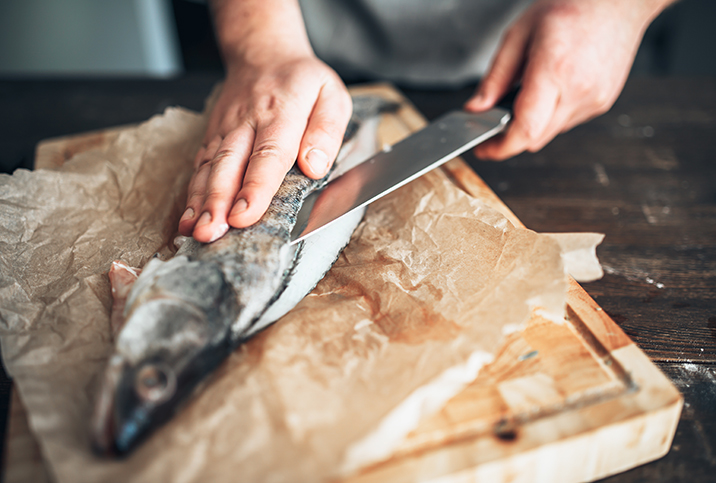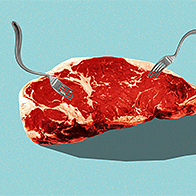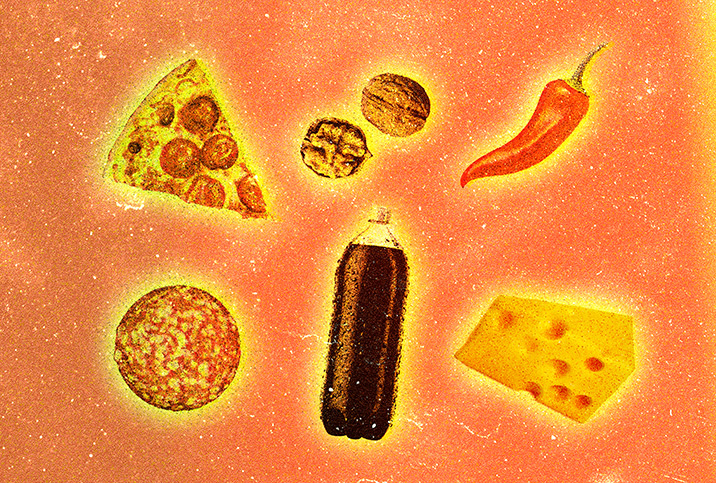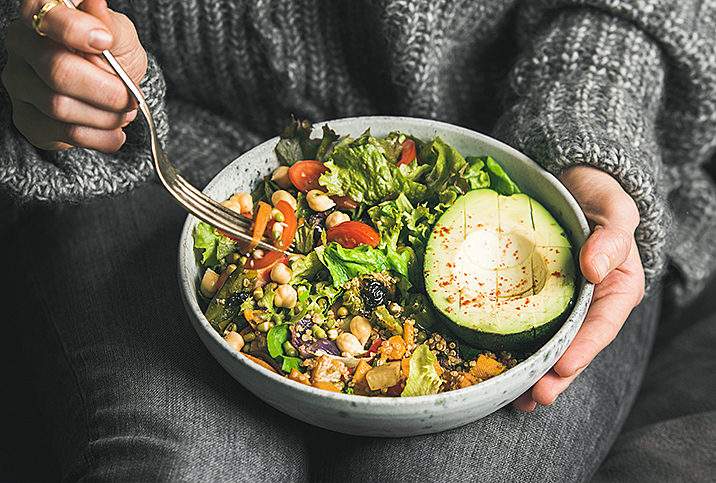Healthy Fats and Proteins Are Good for Your Prostate—What Are They?

Anyone trying to live a healthy lifestyle knows it's not always easy to be sure that what they're putting into their body is good for them. Take one popular brand of "healthy," vitamin-reinforced water, for example. It sounds like a healthy option—after all, why wouldn't you want more vitamins?—however, it's loaded with sugar, and the vitamins are water-soluble Bs and Cs, which, frankly, most people aren't deficient in anyway, meaning you're likely just going to piss them out.
You can't trust everything you read on a label, which makes it difficult to suss out what you should be buying. Should you buy fat-free yogurt? Is plant-based protein better for you?
This dilemma is especially problematic for men worried about their prostate health. Research has shown "healthy fats and proteins" lead to a healthier prostate, but many people may not know what constitutes healthy fats and proteins, what they do for our bodies and what differentiates healthy fats from unhealthy fats. Here's a brief but informative rundown.
Good fat vs. bad fat
Pittsburgh nutritionist Teresa Tao compared healthy fats to substances made by our ancestors.
"Contrary to what some may believe, healthy fats are our friends, and we actually need to consume a diverse array of healthy fats to build our bodies and give us energy," she said. "Healthy fats are fats and oils that use simple equipment to extract from the nut, seed or animal, and do not require further processing to be consumable, such as lard, tallow, coconut oil, cold-press olive oil and butter."
These healthy fats are the building blocks of cells in our bodies. They provide energy, regulate inflammation, keep us feeling full longer, manage our metabolism, help us absorb essential vitamins, ensure proteins are properly used, serve as a protective lining for our organs and, perhaps most importantly, make food taste good.
Healthy fats are the building blocks of cells in our bodies.
Unhealthy fats require much more processing, Tao pointed out. These items include margarine, soybean oil and hydrogenated oils, otherwise known as trans fats, which are found in common foods such as coffee creamers, baked goods, frosting and snack foods.
Unhealthy fats increase the risk of heart disease, stroke, obesity and metabolic syndrome, noted Dan Sperling, M.D., medical director and chief of interventional uroradiology at the Sperling Prostate Center in Delray Beach, Florida.
"We often eat more animal protein than our cells actually need," he said. "Many forms of animal protein not only contain saturated fat but also health-damaging molecules that set up a condition in the body called chronic inflammation, a known culprit in upping cancer risk."
Effects on the prostate
While the effects of an unhealthy diet are obvious in all aspects of our health, it's a bit more difficult to immediately see the impact foods have on prostate health, Sperling said. Healthy prostates maintain a consistent rate of regulating and metabolizing fats for energy, whereas cancer cells are greedy and manipulate metabolic regulation to aggressively accumulate available fats in the bloodstream and prostate bed, he said.
Inflammation caused by unhealthy fats and proteins disrupts the metabolic process of the prostate, while compromising its natural immunity and regenerative abilities. This puts stress on the prostate and, in conjunction with aggressive cancer cells, leads to an overgrowth of the cells, potentially leading to prostate cancer.
We don't often think of eating food as stressful, but what we choose to ingest clearly can contribute to stress in certain regions of our bodies. What's more, it's not just what we eat that matters, but also how we eat.
"One observation from my male clients is that they tend to shove food into their mouths whenever they eat and they eat quickly," Tao said. "For food to be properly broken down, we need to be in a relaxed state—otherwise, if we are stressed and/or distracted, it impacts all digestive functions. Digestion starts in the brain and is a north-to-south process. If our body senses we are stressed, it will divert resources to deal with the stress instead of focusing on digesting our food."
The combination of eating a lot of unhealthy foods in great amounts quickly means our bodies are spending more time combatting the stresses of inflammation, warped metabolism, excess fat cells, and potential external stressors than cancer cells and other harmful toxins.
This leads to the conclusion that you can try two significant but simple actions to improve your prostate health: Make conscious choices about the foods you consume, and eat slower.
Expert recommendations on healthy fats
Sperling and Tao both recommend consuming more lean proteins, such as fish, chicken, turkey and other white meats, and limiting red meats, such as beef, pork and lamb, which are loaded with saturated fats.
When cooking, it's best to use extra virgin olive oil—it is less processed and therefore retains more antioxidants and vitamins than regular olive oil—or avocado, sesame or safflower oil. Avoid items such as margarine, regular olive oil, canola oil and vegetable/soybean oil—and generally lay off fast food.
Tao recommends two actions to maximize the healthy effects of meals:
- Take time before a meal to smell it and signal to the body that it's time to eat.
- Thoroughly chew food until the point of liquefaction, allowing the taste buds to communicate to the brain, and the brain to the digestive system.
"Mindful eating" such as this gives our bodies the appropriate time to work through the process and ensures everything is working as it should.
Ultimately, what's good for the body is also going to be good for the prostate. The first step in making conscious decisions about what to eat is to understand what these different foods will do to your body. Healthy fats and proteins reinforce the body's natural processes, plus leave you feeling energized and full. If you're constantly groggy and tired, consider what's in your diet. Healthy changes might help your prostate, too.




















